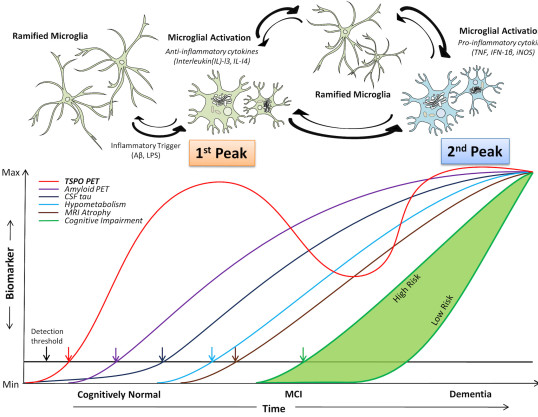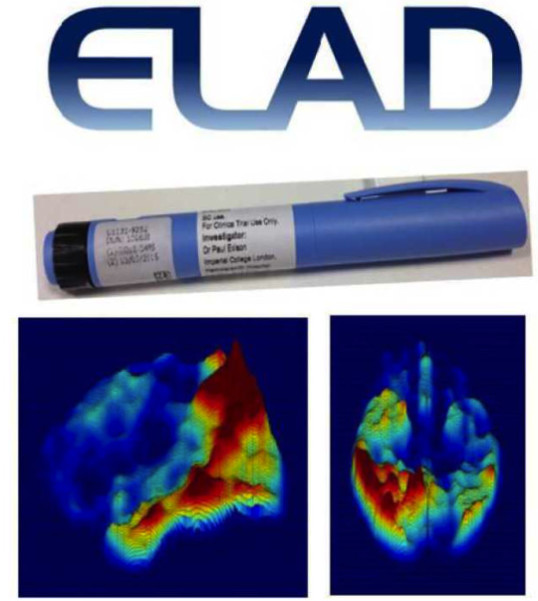Summary
IMPERIAL COLLEGE MEMORY RESEARCH CENTRE
At the Imperial College Memory Research Centre (www.icmrc.co.uk) led by Dr Paul Edison, we focus our research on Alzheimer's disease, mild cognitive impairment, and causes of dementia and cognitive impairment. We evaluate neuroinflammation and neurodegeneration using PET, MRI, and CSF markers. We are now evaluating the relationship between neuroinflammation, tau, glucose metabolism, and structural and functional changes measured by MRI. We heavily focus on basic and translational imaging using PET and MRI. We are evaluating novel therapeutic targets in dementia and cognitive impairment in Phase 1 and Phase 2/3 studies. We are evaluating novel microglial agents in mild cognitive impairment and Alzheimer's disease.
Additionally the unit uses state of the art techniques in PET and MRI in clinical evaluation of people with memory problems.
To take part in any of our studies please contact us on
e-mail: memory@imperial.ac.uk or memory@imperial.nhs.uk
Tel: 020 8383 3704; 020 8383 1969
Neuroinflammation, amyloid, tau, glucose metabolism in Alzheimer's trajectory
At the Imperial College Memory Research Centre we focus our research on Alzheimer's disease, mild cognitive impairment, and causes of dementia and cognitive impairment. We evaluate neuroinflammation and neurodegeneration using PET, MRI, and CSF markers. We are now evaluating the relationship between
neuroinflammation, tau, glucose metabolism, and structural and functional changes measured by MRI. We heavily focus on basic and translational imaging using PET and MRI. We are evaluating novel therapeutic targets in dementia and cognitive impairment in Phase 1 and Phase 2/3 studies. We are evaluating novel microglial agents in mild cognitive impairment and Alzheimer's disease.
Additionally the unit uses state of the art techniques in PET and MRI in clinical evaluation of people with memory problems.

LIRAGLUTIDE IN TREATMENT OF ALZHEIMER'S DISEASE (ELAD)
There is a connection between type 2 diabetes and Alzheimer's disease; people with type 2 diabetes are much more likely to develop Alzheimer's disease than healthy people of the same age group.
The GLP-1 incretin analogue, liraglutide, is licensed and is being used safely in patients with type 2 diabetes mellitus. Experiments in AD transgenic mousemodels have shown that liraglutide crosses the blood-brain barrier, protects cognition, reduces amyloid plaqueformation, reduces inflammatory response, reduces levels of soluble amyloid oligomers, normalises synapticplasticity in the hippocampus, prevents progressive deterioration in glucose metabolism in the brain andincreases the proliferation of neuronal progenitor cells and the number of new neurons in the dentate gyrus. Liraglutide has demonstrated significant neuroprotective effect in preclinical studies and in a proof of concept PET study.
This is a 12-month, multicentre, randomised, double-blind, placebo-controlled Phase IIb study in patients with mild Alzheimer’s disease (AD) led and sponsored by Imperial College London. 206 patients will be randomised on a 1:1 ratio to receive liraglutide (1.8 mg daily by subcutaneous injection) or matching placebo from 20 centres around the UK and Ireland. This study aims to investigate the effect of liraglutide on glucose metabolism, MRI volume changes, amyloid load, tau formation and neuroinflammation using PET and MRI scans. Subjects will have brain scans at baseline and after 12 months of treatment. All scans are done at Imperial College Clinical Imaging Facility

We are leading a multicentre clinical trial between 24 UK research sites, including King's College London, University of Cambridge, University of Southampton, University of Bristol, Birmingham University, University of Brighton, St Georges University of London evaluating the novel diabetic drug, liraglutide in the treatment of Alzheimer's disease (ELAD study). Liraglutide is currently licensed for diabetes, and has already passed through all the aspects of drug development.
To take part in any of our studies please contact us on
e-mail: memory@imperial.ac.uk or memory@imperial.nhs.uk
Tel: 020 8383 3704; 020 8383 1969
Evaluation of astrocyte activation in alzheimer's trajectory using novel astrocyte marker [11C]BU99008 PET
In this study, we are evaluating astroglial activation using novel astrocyte marker [11C]BU99008 in Alzheimer's trajectory. Neuroinflammation and astrocyte activation plays a significant role in neuronal function. An in vivo marker for astroglial activation is necessary to evaluate the role of glial activation on neuronal function. We are now evaluating [11C]BU99008 in different neurodegenerative diseases.
IMAGING AMYLOID AND NEUROINFLAMMATION IN SUBJECTS AT RISK FOR ALZHEIMER'S DISEASE
Neuroinflammation has been proposed to be a link between amyloid deposition, damage to neurons and formation of “tangles”. It has been shown that inflammation takes place with the deposition of amyloid in animals, but the relative timings have not been studied in humans. In this study, we are performing PET brain scans in 140 subjects using [11C]PBR28, a PET marker of neuroinflammation, while [18F]flutemetamol is used to evaluate deposition and [18F]AV1451 is a marker of tau deposition.
EVALUATION OF MICROGLIAL ACTIVATION IN ALZHEIMER’S DISEASE AND MILD COGNITIVE IMPAIRMENT SUBJECTS USING A NOVEL TSPO MARKER, GE180
[18F]GE180 is a novel PET imaging agent that has been developed for the assessment of neuroinflammation. TSPO levels in the normal central nervous system are very low, but increase dramatically in microglial cells in response to brain damage and inflammation. The TSPO tracer, [11C](R)PK11195, has been used for over 20 years to image brain inflammation. However, [11C]PK11195 has a very low specific to non-specific binding ratio and short radioactive half-life, making it a less than optimal imaging agent. In this study we are evaluating the novel tracer, [18F]GE180, in AD and other neurodegenerative diseases.
IMAGING AMYLOID AND NEUROINFLAMMATION IN SUBJECTS AT RISK FOR ALZHEIMER'S DISEASE
With PET we have previously shown that Alzheimer’s disease (AD) subjects have significantly increased accumulation of β-amyloid in the brain. In this research, we propose a proof-of-concept study to characterise the brain uptake of a novel astroglial activation imaging marker, [11C]BU99008, in a population of patients with mild to moderate AD. We will define the relationships between brain uptake of this marker, amyloid deposition (measured with [18F]florbetaben) and cerebral glucose metabolism (measured by uptake of [18F]FDG).
EVALUATING MICROGLIAL ACTIVATION AND REDUCED GLUCOSE METABOLISM IN LATER STAGES OF NEURODEGENARATIVE DISEASES
Genetic and post-mortem studies have highlighted an active role of neuroinflammation in the neuropathology of neurodegenerative diseases. The aim of this study is to assess whether neuroinflammation and related neuronal function in neurodegenerative diseases such as Alzheimer’s and Parkinson’s disease.
AN IN VIVO EVALUATION OF ROLE OF AMYLOID IN DELIRIUM SECONDARY TO INFECTION
Patients who develop delirium have higher morbidity, mortality, institutionalisation, along with longer in-patient stay than non-delirious patients. Delirium is strongly associated with infection and other inflammatory processes in which pro-inflammatory cytokines play a role. Experimental evidence suggests that infection leads to increased production of pro-inflammatory cytokines and this could lead to delirium and accelerated neurodegeneration. In this study, we are evaluating the role of amyloid in delirium.
EVALUATION OF CASPASE ACTIVATION IN ALZHEIMER’S DISEASE USING [18F]ICMT11 PET/CT
The memory problems caused by Alzheimer’s disease are associated with high levels of abnormal proteins in the brain, one of which is β-amyloid. Build-up of amyloid proteins and high levels of the enzyme, caspase, are linked with neuronal damage and cell death in the brain. This study evaluates the novel PET radiotracer, [18F]ICMT11, which specifically highlights the parts of brain with high caspase levels. In this study we aim to look at caspase activation in the brain using the radiotracer [18F]ICMT11. We will also use MRI to compare with the PET scan
COMMERCIAL STUDIES
A 24-MONTH, MULTICENTER, RANDOMISED, DOUBLE-BLIND, PLACEBO-CONTROLLED, PARALLEL-GROUP, EFFICACY, SAFETY, TOLERABILITY, BIOMARKER, AND PHARMACOKINETIC STUDY OF AZD3293 IN EARLY ALZHEIMER’S DISEASE
Alzheimer’s disease (AD) is a progressive and fatal disorder of the nervous system, which results in amyloid plaque formation in specific regions of the brain, which is associated with inflammation and loss of neurones and synapses. AD is characterised by memory loss and progressively impairs activities of daily living.
Beta-site amyloid precursor protein-cleaving enzyme 1 (BACE1) is involved in the formation of amyloid plaques in AD. BACE1 is therefore considered to be a promising therapeutic target for slowing down or halting disease progression in AD. BACE1 splits amyloid precursor protein (APP) into a group of peptide fragments, which are the main component of the amyloid plaques. The study drug, AZD3293, is an inhibitor of BACE1 and has been shown to reduce peptide fragments in mice, rats, guinea pigs, dogs and humans. The study is being carried out to test whether AZD3293 modifies the clinical course of AD by delaying disease progression in patients diagnosed with early AD.

